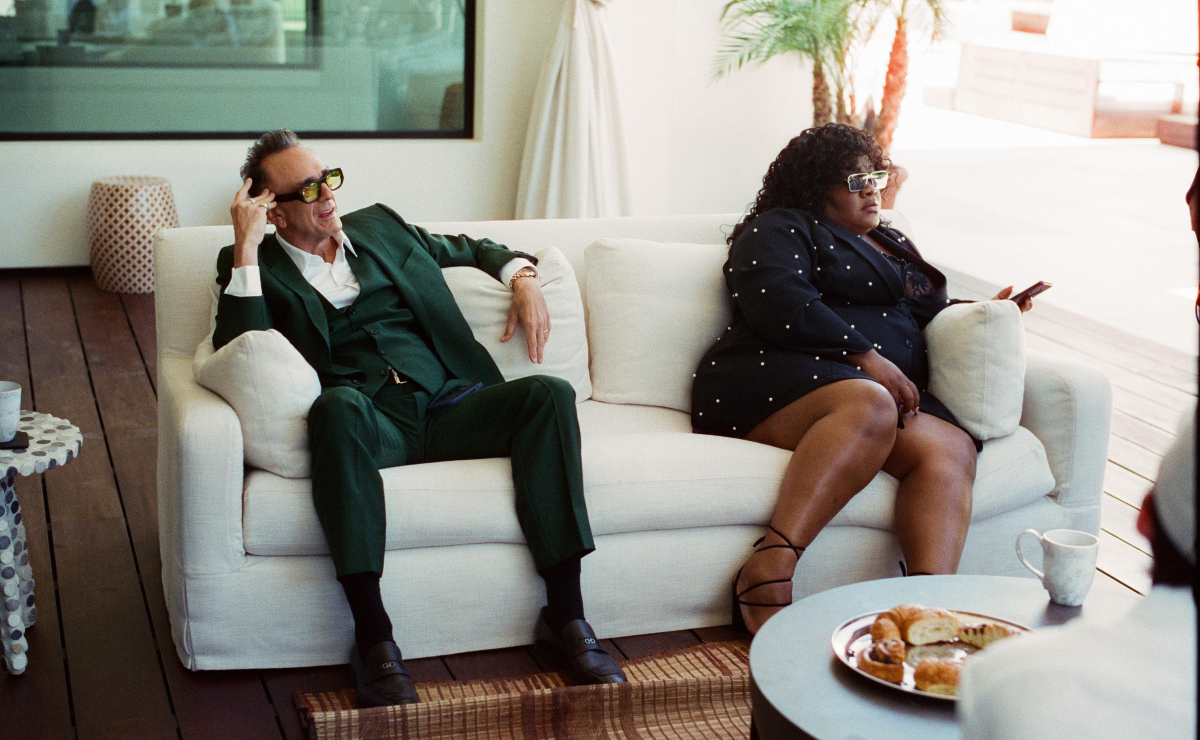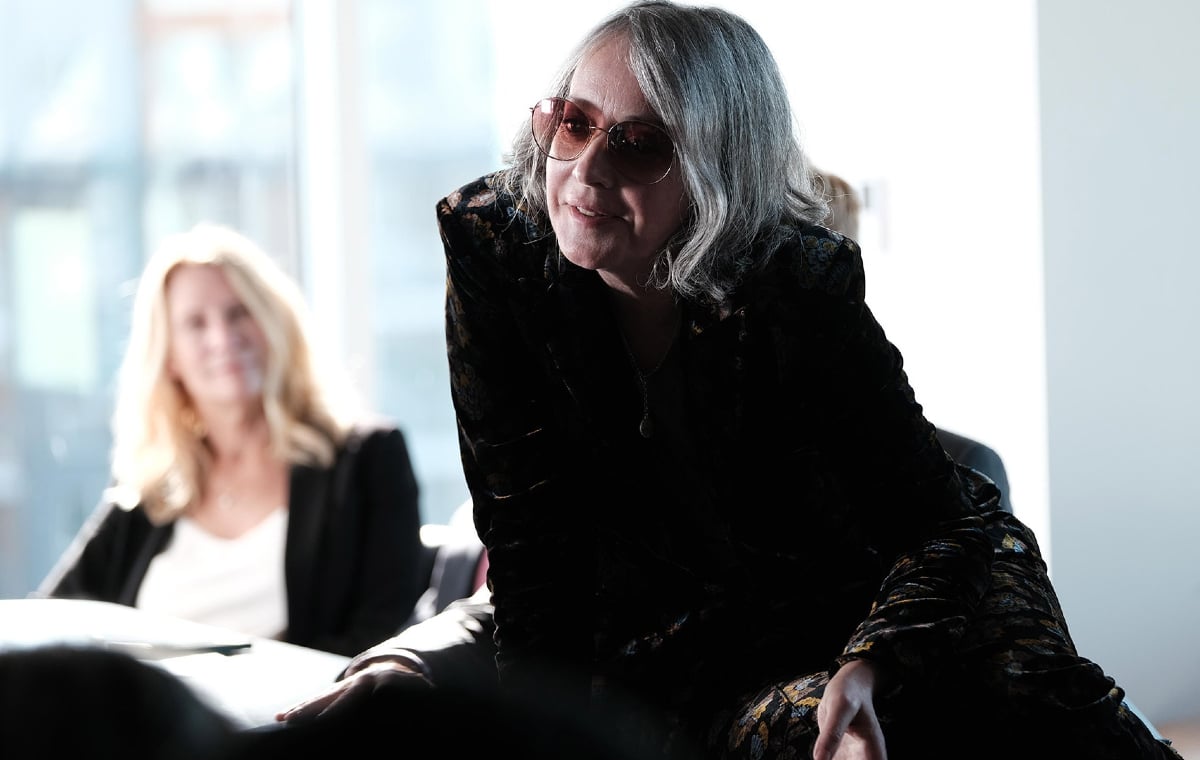Months before it ever aired, The Idol was a source of controversy. With Sam Levinson’s name attached, that was probably inevitable, but the scrutiny intensified over the past year amid reports of an exploitative set, the ousting of director Amy Seimetz, and criticisms of how The Idol depicts its embattled pop star protagonist, played by Lily-Rose Depp. In the time since its Cannes premiere, several stars of the HBO series—including Depp—have refuted claims about exploitative working conditions. As co-star Jane Adams points out, no one is listening. Maybe because they don’t want to hear it.
Adams is an industry vet whose credits include everything from indie cult classics (The Anniversary Party, Happiness) to critically acclaimed TV series (Hung) and films (Little Children, Eternal Sunshine of the Spotless Mind). In The Idol, Adams plays Nikki Katz, a shrewd record label exec whose treatment of pop star Jocelyn (Depp) is only slightly less exploitative than Tedros, the cult-like figure played by series co-creator The Weeknd. Because Nikki, Chaim (Hank Azaria), and Destiny (Da’Vine Joy Randolph) are acting in a professional capacity as Jocelyn’s team, their predations are seen as part and parcel of commercial pop stardom.
Adams was one of the first to reject accusations, initially published in Rolling Stone, of The Idol‘s unethical working conditions. Speaking with the Los Angeles Times, Adams, Azaria, and Depp maintained that their experiences while filming The Idol were positive. But in reviews and on social media, the accusations continued to color the conversation; for many, the claims validated their problems with Levinson, the series, and its graphic nudity and sex scenes.
In a recent interview with Vanity Fair, Adams reiterated her affection for the series. She had less kind words for those who continue to cite the Rolling Stone report despite strong objections from multiple female cast members. Whatever your feelings are about The Idol and Levinson, and however justified those opinions may be, Adams has a point:
“What is amazing to me is no one’s listening—I’ve not seen that before in all my days, such a dogged ‘We refuse to change the narrative,’” Adams says. “I especially want to say to all the feminists, ‘Go fuck yourself.’ All these women that I’m working with are talking about their experience and you’re not listening. You’re not listening!”
Adams is obviously generalizing in her reference to feminists, and while the wording is … terse, she’s right: For all the post-#MeToo demands to “believe women,” it seems that no one wants to believe women when they reject a narrative of victimization. In an interview with Vulture, Randolph similarly refuted the Rolling Stone report, maintaining that she would’ve walked off the set if any of it were true:
“I’ve worked enough in this industry, though I have a very young career, that the moment I would have felt like, ‘Hmmm, something’s wrong …’ I would have been like, ‘Get me out of here!’ I’m grown! I’m in my 30s! I get it, rumors, blah, blah, blah. But I promise you, I would not have done this project at this stage in my life if that was the case.”
Most of the backlash to The Idol is couched in claims that the production mirrored the exploitative treatment of its main protagonist. There’s a seeming inability (or maybe even a refusal) to divorce these reports from the end product. To be fair, separating the art from the artist is nearly impossible when the artist asserts themselves as an auteur.
Levinson, the creator of Euphoria and director of the films Assassination Nation and Malcolm & Marie, has cultivated himself as an auteur, which naturally attracts closer scrutiny—for better and, as is often the case with Levinson, for worse. When Levinson and The Weeknd took over The Idol, rewriting and reshooting the majority of the series following Seimetz’s departure (the details of which remain somewhat unclear), there was a certain consensus over what that meant. Levinson is a good conceptual filmmaker, but writing is not his strong suit. It’s why the standalone episodes between seasons 1 and 2 of Euphoria are stronger than almost anything else in the series. The episodes, which center on Zendaya and Hunter Schafer’s characters, were made in collaboration with each of the actors; Schafer wrote her own episode.

Some of the best moments in The Idol feature Randolph, Adams, Azaria, and Rachel Sennott, who plays Jocelyn’s best friend and assistant, Leia. According to Randolph and Adams, Levinson was very collaborative in the creation of their characters and encouraged improvisation. Their performances bear that out; The Idol is immediately more interesting when Adams, Randolph, and Sennott are on screen. Even Troye Sivan, the singer and former YouTube personality, is compelling—arguably far more than The Weeknd, who struggles to navigate his portrayal of the sleazy Tedros.
To many, it seemed as if Levinson and The Weeknd were turning The Idol into another Euphoria— senseless nudity, graphic scenes of sex and abuse, edgelord provocations. It didn’t help that The Weeknd’s character, Tedros, is a narcissistic predator with a proclivity for cringey sex talk, whose treatment of women was cribbed straight from PornHub. But there is a self-awareness to The Idol: In the first episode, Jocelyn and Leia (Rachel Sennott) watch Basic Instinct, Paul Verhoeven’s 1992 erotic thriller starring Sharon Stone as a duplicitous author.
Verhoeven is less precious and more of a collaborator than Levinson, but the two are similar in some respects. In the years since it was released, Basic Instinct has been trashed, lauded, and reclaimed as a tale of female empowerment. Of the infamous scene in which Stone’s character uncrosses her legs, revealing her vulva to a room full of sweaty men, the actress has said she was tricked into not wearing underwear. She only learned that her vagina was on full display when she watched the completed film in a room full of men; art imitating life.
Levinson is a similarly provocative creator who seems to accept—if not embrace—the controversy around his projects. Regarding the allegations in Rolling Stone, Levinson told the Los Angeles Times, “When my wife read me the article, I looked at her and said, ‘I think we’re about to have the biggest show of the summer.’” He was right, in a sense, though much of the talk surrounding The Idol is negative and hyper-fixated on the men who made it.
In her interview with Vanity Fair, Adams cites her age as an advantage in the relentless discussions about The Idol—the production and the product—and speaks to something I grapple with often: the impulse to preemptively apologize for liking any media that’s problematic, divisive, or that was made by a sexual predator 50 years ago.
“These days, to certain people, you almost have to apologize when you dislike something or you love something.” She is not apologizing today: “I don’t really care anymore. That is one good thing about being a gray-haired lady—it’s almost like you get a license to not care.”
Again, Adams is right. It’s become a cliché, but: there’s no ethical consumption under capitalism. And unfortunately, much of the art we consume is produced and distributed by capitalists. “People don’t have to love it,” Adams says in the same interview. “I just find it oppressive—the kind of, ‘Well, you shouldn’t like it because …'”
When it comes to The Idol, the end of that sentence is usually some variation on “the production was exploitative.” But Depp, Adams, Randolph, and their collaborators have said that simply was not their experience. There’s something insidious about only believing women when it fits a narrative that’s been widely agreed upon, and choosing not to believe those who tell a version of the story we’d rather not hear.
The complete disregard of Depp, Adams, and Randolph’s experiences is ostensibly more offensive than anything in the actual series; it’s dismissive of their work, their agency, and their integrity. Unless they explicitly state otherwise, these adult women chose to participate—and collaborate—in The Idol. Whatever you don’t like about Levinson or the series can be expressed without denying these women their agency in the matter.
(featured image: HBO)










Published: Jul 7, 2023 03:16 pm